Kerryn Goldsworthy on 'The Slap' by Christos Tsiolkas
The slap that I wanted to deliver with that book was to a culture in Australia that had literally made me sick, sick to the stomach. A middle class culture that struck me as incredibly selfish and ungenerous … I wanted to try and write a book ... that represented that culture. And to do that, honestly, I had to put myself in the middle of it. I also had to put my Greekness in the middle of that book. Because I didn’t feel separate from the things that were disgusting me.
Christos Tsiolkas, Journal of Intercultural Studies 2013
Born in Australia in 1965 to parents who had emigrated from Greece, Christos Tsiolkas grew up in suburban, working-class Melbourne. His name first became familiar to Australian readers during the ‘grunge lit’ period of the 1990s. His first novel Loaded (1995) was often cited as one of grunge lit’s key texts, along with Justine Ettler’s The River Ophelia (1995) and Andrew McGahan’s Praise (1992): novels written in blunt language about the lives of disaffected people, more or less young and more or less angry, whose lives revolve around sex and drugs and who seem to have no legitimate – or legitimised – place in a society they mostly despise and reject.
Loaded, published when Tsiolkas was only thirty, was generally regarded as semi-autobiographical and deals with a young gay Greek man in flight from the values and constraints of his society and his family. Since then Tsiolkas has cemented his reputation as a novelist of uncompromising political and moral seriousness, a ruthless examiner of the effects of middle-class values and capitalist society on individual lives. The Slap (2008) is his fourth novel; since then he has published a fifth, Barracuda (2013), and a collection of short stories, Merciless Gods (2015). He is also an essayist and screenwriter, and has worked collaboratively with directors, photographers, and other writers.
Most of Tsiolkas’s books to date have been longlisted or shortlisted for multiple prizes and Loaded was adapted as a feature film, Head On, in 1998. But The Slap was a breakout success, establishing his international reputation: in Australia it was shortlisted for the Miles Franklin Literary Award and won the Australian Literary Society’s Gold Medal, the Victorian Premier’s Literary Award for Fiction, and the Australian Booksellers Association Book of the Year award; internationally it was longlisted for the International IMPAC Dublin Literary Award and the Man Booker Prize, and winner in the Overall Best Book category of the Commonwealth Writers’ Prize. In an appreciative and prescient review of the novel when it was first published near the end of 2008, writer and critic Gerard Windsor foresaw the television adaptation: ‘The Slap cries out to be made into an eight-part mini-series.’ And it was, very successfully, in 2011.
‘The Slap was a breakout success, establishing his international reputation’
Written as an exploratory snapshot of suburban Australian society during the Howard years, The Slap features eight main characters who are interconnected in the strange molecule-like way of so many urban and suburban tribes, a combination of social, familial, and workplace groups. While the mode of this novel is uncomplicated and unrelenting realism, and while all the characters more or less fit under the large umbrella of the category ‘middle class’, the cast of major and minor characters seems deliberately and schematically multicultural and multi-ethnic: Anglo-Celtic Australians or ‘skips’ (short for Skippy, as in Skippy the Bush Kangaroo) are in a small minority, while the ethnic and religious identities of other characters include Greek, Indian, Serb, Aboriginal, Jewish, and Muslim. One implication of this is that Australian society has now progressed beyond self-conscious multiculturalism, and that multi-ethnicity, with all its complications, is now the norm and a true cosmopolitanism the ideal.
Hector, the character more or less at the centre of the group, is a Greek-Australian man whose birthday party provides the occasion from which the plot unfurls. His wife Aisha is a beautiful, tough-minded vet, one of a trio of female friends who go much further back in her life than her marriage: she has been friends with Rosie and Anouk since they were teenagers back home in Perth. Hector’s cousin Harry is a brash, sometimes brutish, businessman who owns and runs a chain of auto repair shops, and Hector’s father Manolis is an elderly Greek man who emigrated to Australia when young and who finds contemporary Australian society bewildering in its superficiality and selfishness. Connie is an orphaned schoolgirl who works on weekends at Aisha’s surgery and fancies herself in love with Hector, whose reciprocal sexual interest in her is established on the first page; and Richie, son of Aisha’s vet nurse, is a shy gay teenager and Connie’s best friend.
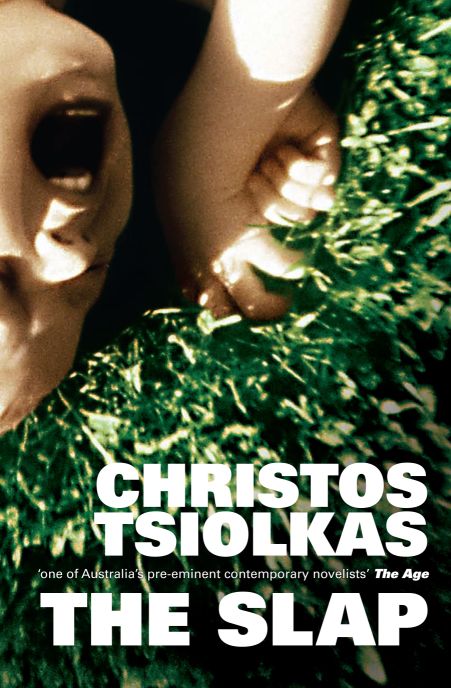 The Slap (Allen & Unwin hardback edition, 2008)
The Slap (Allen & Unwin hardback edition, 2008)
Buy this book
All of these people, plus assorted spouses, partners and children, are present at Hector’s birthday backyard barbecue. Hugo, the spoiled three-year-old son of Rosie and her husband Gary, has been annoying the other children all afternoon and eventually throws a massive tantrum when declared out in a game of backyard cricket. He is about to hit Harry’s son Rocco with his bat when Harry sees him and descends on him, lifting him into the air. Hugo kicks out viciously, and Harry, who is given to easy rage and not very interested in controlling it, gives Hugo a resounding slap.
And from this moment, each of these eight main characters proceeds to some sort of internal crisis, as the fallout from the slap continues to destabilise their lives. Rosie, whose excessive outrage hints from the outset at some history of instability or guilt, dubs Harry ‘the monster’, refers to the slap as ‘bashing’, calls the police, refuses to accept the belated apology that Harry is eventually persuaded to offer, and in general appears increasingly unhinged. Aisha, repelled by Harry’s violence to a small child and stubbornly loyal to Rosie, is nonetheless torn by her loyalty to Hector and his family, a response that is complicated by her own sexual adventures elsewhere. Anouk, accidentally pregnant at forty-three to a boyfriend little more than half her age, is already ambivalent about the pregnancy and is further put off the whole idea of having children by the protracted trouble over the slap and its aftermath. Everyone is affected: loyalties are divided, friendships stretched to breaking point, and values called into question.
The Slap was inspired by a real-life incident that Tsiolkas calls ‘a gift’:
I attended a barbecue at my parents’ house … A friend’s young son was playing at my mother’s feet as she was rushing around her small kitchen. She kept telling him to stop [but] at one point he opened up a cupboard and upset pots and saucepans all over the kitchen floor. My mother, exasperated, turned around, lifted the boy and gave him the most gentle of smacks on his bum … he placed his hands on his hips, looked up at my mother and said, ‘Don’t! No one has the right to touch my body without my permission.’
Tsiolkas is at pains to point out that his mother’s admonitory tap on the bottom had nothing in it of the violence and rage that animates Harry in the novel when he strikes the shocked Hugo, and that the real child’s mother, like everyone else present, had found the incident funny. But he identifies that moment as the beginning of the writing process:
all I could think of was the look of incomprehension on my mother’s face and the boy’s face when they were staring at each other. The adult … was raised in a Balkan village where women were denied education … The young boy was being raised in a world where gender, sexuality, childhood and adulthood were in a constant state of change. How to make sense of both of these experiences of Australia … of what was now middle-class life, of what was suburbia? I had the beginning of my novel … I had been handed a gift.
The novel is divided into eight sections, one for each of the main characters, and the switches from one character’s point of view to the next keep the plot motoring along. This structural insistence on individual consciousness and point of view, keeping one character at a time before the reader’s eyes, may seem an unexpected technique for a writer so concerned with the tides and currents of society; but his exploration of individual behaviours and beliefs is a way of showing how certain social values come to prevail, and how individual failures – of generosity, of loyalty, of patience, or simply of nerve – can rip holes in the social fabric.
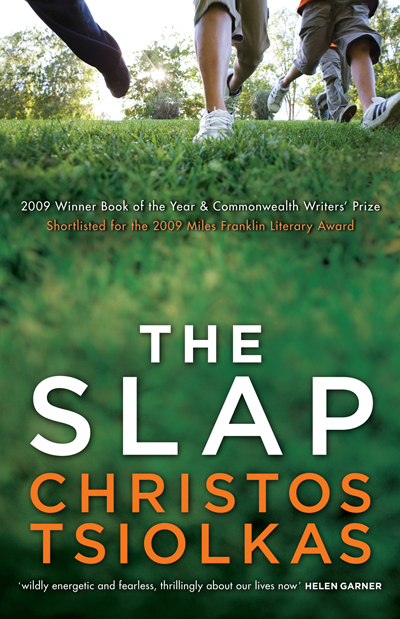 The Slap (Allen & Unwin, 2010)
The Slap (Allen & Unwin, 2010)
Buy this bookA common assumption about this novel is that the colloquial, easy-to-read, and often rough and clichéd prose style is simply a weakness in Tsiolkas’s writing. But there is something more complex going on: Tsiolkas makes extensive use of the narrative technique called free indirect discourse, a style that mimics the voice of a character without actually using first-person narration or the mode of direct speech. In her review of Tsiolkas’s 2015 short story collection Merciless Gods, Susan Lever offers an incisive critique of this mode of narration and its limitations:
[Tsiolkas] holds to a discipline of sympathy with his characters, no matter how repellent they may be, and restricts his own verbal range to the limits of their vocabularies. It is a serious inhibition for a writer to accept, as it reduces so much of his fiction to the platitudes and obscenities of shallow characters.
The platitudes and obscenities are nonetheless there for serious aesthetic and ideological reasons: the comparisons that come to mind here are with the Scottish writers James Kelman and Irvine Welsh and Ireland’s Roddy Doyle.
But Lever’s comments also point to an internal contradiction in this kind of writing: the technique of writing from within the characters’ own verbal limitations invariably limits what can be made explicit in prose – especially in prose whose primary purpose is to communicate complex ideas. And this is not the only internal contradiction in the book: Tsiolkas sets conflicting ideas and values against each other all through the story. This technique is at its most obvious in the pivotal moment when Harry slaps Hugo: the reactions of the novel’s characters, as indeed of its readers, are evenly distributed along a spectrum whose extremes are ‘The man is a monster’ and ‘The brat had it coming.’ The urgency and energy of The Slap comes largely from such sites of conflict and rupture, and the critic James Ley has pointed out one of them in a long review of the novel:
Much of the energy of [Tsiolkas’s] writing is generated by the friction between a frustrated idealism of the left, which sets itself against inequality and exploitation and prejudice, and a tough-minded realism that wants to insist upon the regressive impulses that perpetuate these social evils.
Other such tensions include the opposition set up in the novel between the critique of individualism and the emphasis on identity politics – of ethnicity, sexuality, gender, and class. But the most problematic of these, and perhaps the least deliberate, is the dilemma posed by this novel for female readers and feminist critics. Many female readers find the female characters unconvincing, especially when it comes to their sexual behaviour and responses. But this is an admittedly subjective view and there is no way of proving or disproving it. And Aisha, Rosie, Connie and Anouk, different as they are, all escape many of the fates that have traditionally befallen female characters in fiction written by men. They have social and sexual autonomy and agency; they are given equal air time; and they are not represented either as projections of male fantasies about women, or as relative and secondary characters whose function in the story is subordinate to that of the boys and men.
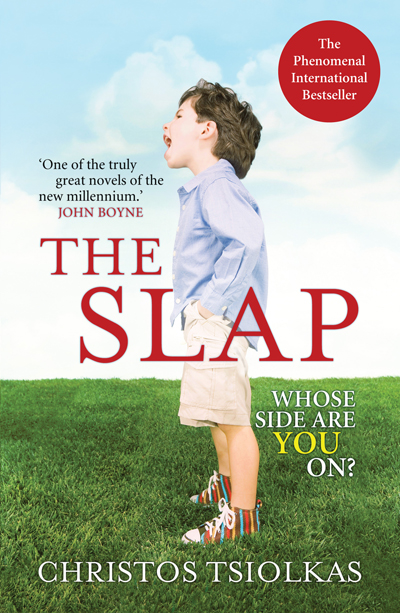 The Slap (Atlantic UK edition, 2011)
The Slap (Atlantic UK edition, 2011)
Buy this bookBut a more troublesome aspect of The Slap for feminist critics is that while it sets its face against inequality of all kinds, and while Tsiolkas is clearly sympathetic to feminism in a general way, the only two characters in whom any sort of moral authority resides are both traditional patriarchs. Manolis is an old Greek man with an old Greek man’s values, and Bilal is an Aboriginal convert to Islam and clearly the formal head of his family. Tsiolkas has said that Manolis is his favourite character – ‘the one character that I am really glad that I wrote is Manolis, the old man in The Slap, because that’s what I’m trying to say’ – and that it is Bilal who ‘delivers the real slap in the book’. The real slap, says Tsiolkas, and it is for him ‘the centre of the book’, is contained in Bilal’s words to Rosie: ‘You’re no good. Your people, your world is no good. I don’t want you to have anything to do with my family. I don’t want you to have anything to do with my life.’
The common failing in these characters is the selfishness that propels so much of their behaviour. It comes in different forms: material, sexual, familial, and social, manifesting in such things as Harry’s snobbery about suburbs and pride in expensive household goods, or Rosie’s maternal self-indulgence at the expense of everyone else including the child in question, or the indifference to the plight of the world’s poor and marginalised that is shown by most of the characters. When Geraldine Doogue asked Tsiolkas in 2011 on ABC TV’s Compass what an ideal Australia would look like for his generation, he replied:
It would certainly be an Australia that would be much more thankful. … I would say, ‘Stop bloody whinging. Stop complaining. Stop wanting more. Stop thinking it’s all about the frigging plasma screen and stop thinking that a few thousand boat people [are] going to do anything to change what you have.’ I will say that’s what I would want for Australia.
References:
Compass. ‘Christos Tsiolkas: Man Behind The Slap’. ABC TV, 9 October 2011.
Lever, Susan. ‘Christos Tsiolkas’s Severely Confined Art’. Australian Book Review no. 368 (2015)
Ley, James. ‘A Furious Moralist’. Australian Book Review no. 306 (2008)
Papastergiadis, Nikos. ‘Hospitality, Multiculturalism and Cosmopolitanism: A Conversation Between Christos Tsiolkas and Nikos Papastergiadis’. Journal of Intercultural Studies, 34:4, (2013)
Tsiolkas, Christos. ‘Guardian Book Club: Christos Tsiolkas on how he wrote The Slap’. The Guardian, 17 January 2014
Windsor, Gerard. ‘When the Smoke Clears’. The Sydney Morning Herald, 1 November 2008


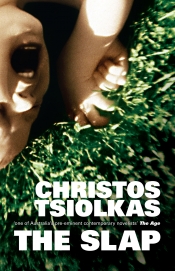





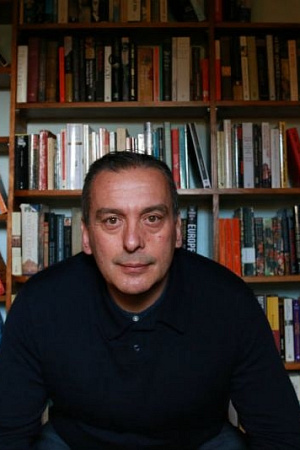
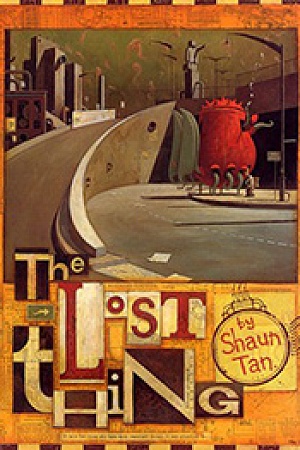
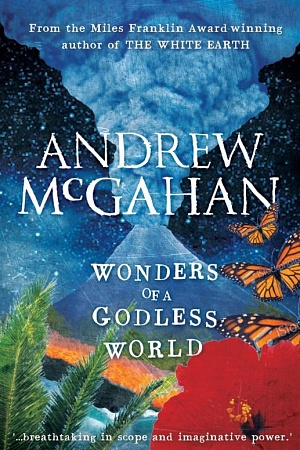
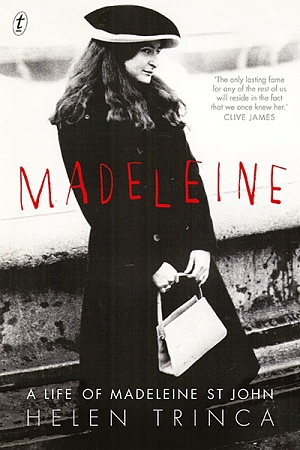
Comment (1)
Leave a comment
If you are an ABR subscriber, you will need to sign in to post a comment.
If you have forgotten your sign in details, or if you receive an error message when trying to submit your comment, please email your comment (and the name of the article to which it relates) to ABR Comments. We will review your comment and, subject to approval, we will post it under your name.
Please note that all comments must be approved by ABR and comply with our Terms & Conditions.